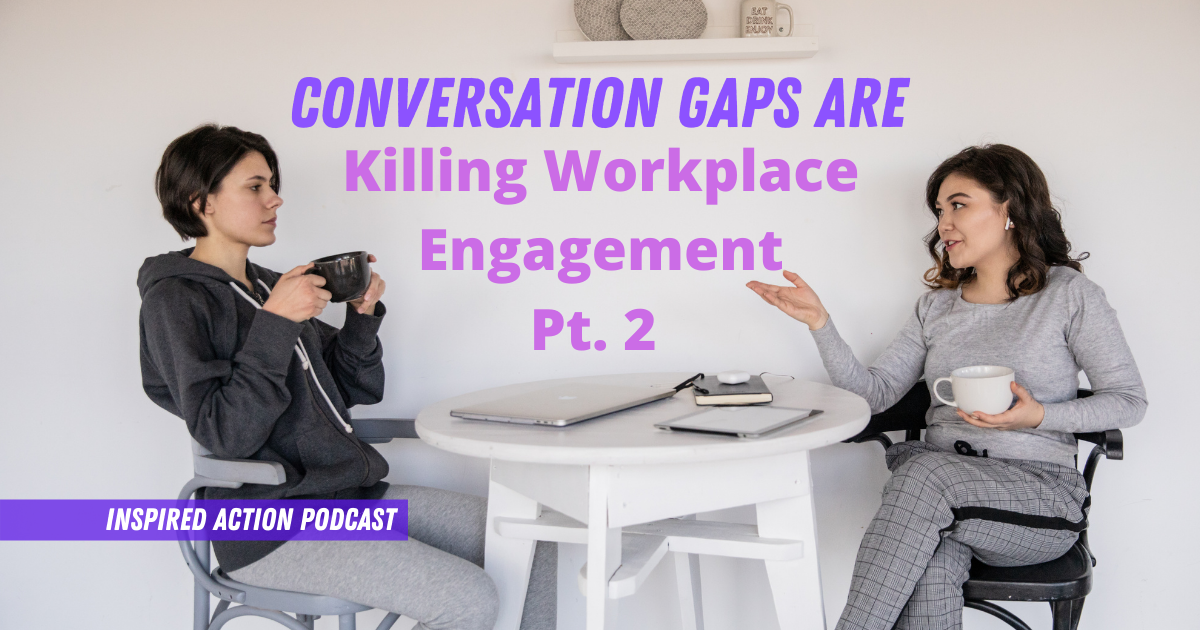“Conversation Gaps are Killing Workplace Engagement – Part 2” Brief Summary:
Difficult conversations. Are you having the difficult conversations in your organization? Or are there conversation gaps? Did you know not having difficult conversations in the workplace is actually killing team and employee engagement? In the second part of this Inspired Action For Imperfect Humans podcast episode, Hosts Kyle Kalloo and Christopher Lawrence discuss and define the problem of difficult conversation avoidance, and also get into some resolutions.
“I’ll tell you what toxic workplace includes gossip. I should know I got involved in it and caught up in it and some really bad ways, a number of years ago. And it is toxic. It’s not just creating a toxic work environment, but it’s destroying your psychology.”
Summary:
- Introduction
- Statistics of not having difficult conversations
- Why accountability is important
- Gossip. Why not to do it.
- How to give feedback in the workplace
- Christopher tells his story of his time with an energy company
Calls to Action:
Even before the remote workforce evolution, office culture was inherently fragile. After all, it’s made up of imperfect humans interacting with other imperfect humans. And while perfection isn’t the goal, we all secretly wish for a workplace where people find ways to bring out the best in each other. Unfortunately, that’s not always an intuitive skill. It takes guidance, practice, and then more guidance and practice… but with the right leadership, it’s definitely achievable. How do you enhance your workforce’s ability to engage, collaborate, and adapt in this volatile and uncertain reality? Get the answers to your culture questions when you setup a complimentary Discovery Session with Kyle Kalloo at https://ChangeMyLifeCoaching.as.me/?appointmentType=14623413
Not loving your career? Feel you need a change in your job? Let’s Strategize! Book a complimentary Strategy Session with Christopher Lawrence here: https://ChangeMyLifeCoaching.as.me/?appointmentType=14044176
Tell us your “inspired stories” stories by visiting www.InspiredActionPodcast.ca
Christopher Lawrence LinkedIn: https://www.linkedin.com/in/career-life-coach-christopher-lawrence/
Kyle Kalloo LinkedIn: https://www.linkedin.com/in/kyle-kalloo/
Change My Life Coaching & Change My Business Coaching LinkedIn: https://www.linkedin.com/company/6446498/admin/
Looking to create a corporate coaching culture? Reach out to Kyle Kalloo: [email protected]
Website: https://strategicleader.ca
“Conversation Gaps are Killing Workplace Engagement – Part 2” Transcript:
[00:00:00] If you’re a co-worker, I’ll tell you what toxic workplace includes gossip. I should know I got involved in it and caught up in it and some really bad ways, a number of years ago. And it is toxic. It’s not just creating a toxic work environment, but it’s destroying your psychology is the thought of being imperfect, keeping you from taking action.
Welcome to inspired action for imperfect humans. Each week, we give you real life stories and thought-provoking research that inspires your soul to live a more fulfilled life through your own actions. From the heart of Calgary Canada. Here are your hosts award winning coaches, Christopher Lawrence and Kyle Kalloo.
Here we are. Again, welcome back the part two of avoidance with conversations. That’s right, man. We got into a real good conversation there last week. Didn’t we Kyle? Absolutely. We’re still talking about it. So we’ve, we’ve been talking about, [00:01:00] we’ve been talking about having difficult conversations and how so many people in north America are avoiding having difficult conversations and where we left off, as we were just about to get into kind of defining the problem and.
Get into some resolutions. And I think certainly there’s something that we can do, Kyle, in terms of like teaching about mastering difficult conversations. But I actually don’t think that’s as helpful as talking about it maybe more globally right now, which is, I think if folks want this to work, like I look at it, how many times do we teach something?
And it’s like, yes, it works. It works, it works. It works. It works right. But I think it works better when you can actually create a culture of accountability for this, which means that you have to bring somebody in to teach you as an organization, how to have difficult conversations. And [00:02:00]then you create a culture of accountability because how often are those conversations?
Like how often do you guys bring somebody in to have something like this? And then it gets shelved. Like what a waste of money. Do you know what the research is showing that despite so 10 years ago, this was a, uh, study in, in 2009. So that’s more than 10 years ago now. And they kind of called it the avoidance of scary workplace conversations.
Okay. It was 2009 study despite the ten-year gap and billions of dollars businesses have invested people like in people development for these conversations, there’s still a 70% gap. Meaning the same challenges have persisted in the last decade. That existed 10 years ago. It’s like, this is a whole other episode, but it’s like work life balance, [00:03:00] um, initiatives, billions of dollars, and people are more burnt out now than they were before.

Stop spending money on work-life balance initiatives. You need to take an individualized approach to finding out what people value when it comes to conversations. There, there are specific reasons. Why you’re spending all this money, your organizations are spending all this money. Why you as employers are spending all this money and it’s not that it’s not good.
You know, we get, we get presentations on this all the time, but we rarely just give the presentation and walk away. Right pocket. Yeah. You know, when we think about it, you know, cause everyone wants accountability. We see it on, on job surveys. We see people talk about it. You know, when we engage with leaders that we work with, they’re saying the exact same thing.
They want accountability and not only leaders are asking for accountability and correct me if I’m wrong. Employees are also asking for accountability. They’re saying, why are they not holding them accountable? [00:04:00] Like I’m doing the thing. Well, I’m trying to say what, uh, why are they not holding people accountable?
Right. And so sometimes they’re, you know, what is getting in the way. And so for this episode, we really want to do. Paint a picture. So we can talk about what are some, one or two things that you guys could really be focusing on from a solution perspective, because I know some of you are thinking, yeah, yeah, I hear you.
Yeah. Yeah. That’s happening. Yeah. Yeah. But what can I do about it? Right. So when everyone is committed to a clear plan of action, they are better able to hold people accountable. What does that mean? It means that we have to communicate, have conversations with people so we can get a commitment. So then we can hold them accountable.
And here’s the thing, and this is all, if I could just say something Kyle, that’s it, like you have to create a baseline for what these conversations need to look at. This is some of what our organization focuses on. There are certainly hundreds of organizations that do this. That’s the first thing, but the second part is the [00:05:00] commitment.

And the third part is the accountability to that commitment. And here’s the thing with the accountability. This is not just for the leaders to hold other people accountable, because think about that. Just think about this for a second. How many times your leader comes and talk to you about what Susie bell said to them about what you did or didn’t do the whole time they’re speaking to you.
You’re thinking. That B word. Why did she come and talk to me? Why does she have to go tell my manager why? And here’s the thing. It is not just a responsibility. It is a interpersonal philosophy that you should have to say. I heard that Christopher committed to this. So now I’m actually empowered to go say to Christopher, Hey, I heard you committed to this.
What happened? Oh girl, can you, unless you are a lustrous leadership coach, um, wasn’t that ragging? Wasn’t it, it wasn’t. I ragging on you about having a swollen [00:06:00] head, uh, last episode. So listen, um, Illustrious life coach. You said interpersonal philosophy, interpersonal philosophy. I’m wondering if you could talk about that, Kyle, in context of this difficult conversations thing, right?
Like there is something that gives you the right to hold somebody accountable to their commitments. Tell me more about that interpersonal philosophy. Go ahead. Whenever you like. Go ahead and get started. Interrupting team members must be willing to call one another out on behavior, off their performance that isn’t, um, up to standard, right?
Only because we can have that conversation. And that means if the environment is set up, that I can actually say that, that I could say, listen, Christopher, you and I were having a conversation. You made a commitment to me that you were going to get this back to me. And I didn’t. Right. So here’s how we [00:07:00] take it a step further to ensure we set up the, the environment.
When, when someone goes to the leader, let’s say that I’m the leader. Say that Christopher came to talk to me about Susie bell. I’m going to say, after I hear Christopher talks to me, I’m going to say. Christopher what happened when you spoke to Susie bell about this? So I appreciate you mentioning it to me, but what happens when you spoke to Susie bell?
If Christopher says I didn’t talk to Susie bell, I’m telling you, so you can go talk to her. I need to empower and train and coach Christopher on. Let me tell you this, Christopher, that it’s important for you to have this conversation. That’s not just for the leaders. That’s for everybody. If you’re a co-worker.
Toxic workplace includes gossip. I should know I got involved in it and caught up in it and some really bad ways, a number of years ago. And it is toxic. It’s not just creating a toxic work environment, but it’s destroying your psychology, your right. Your gossip. Your participation in gossip is destroying your psychology instead, go have the effing conversation [00:08:00] with them.

And if this isn’t just about the leaders is like, if, if my peer is talking to me about Susie bell, who’s having about, you know, who who’s doing this and doing that. It’s my responsibility to say, I’m wondering, have you had a conversation with Susie bell? Cause I’m not sure that I can help you with that.
And as a peer, you can coach and you can mentor and you can support people through having it, but stop accepting less than very poor, addictive, bad behavior from yourself. Right? Cause they’ll tell you what. I will tell you what if they are talking about Susie bell to you, they’re talking about you to Susie bell, it’s happening, it’s happening.
So we have to have a culture of accountability. Now I want to point something out with your call. You said we have to be able to call each other out on this. I think it’s really important. Cause you gave an example of how to do that. A couple of examples that actually. I think it’s really important that people understand it’s not like calling out, like in that.
Well, [00:09:00] you said, blah, blah, blah. There is a structured way to give this feedback in a culture of accountability. So. I’m wondering if you could kind of elaborate on that. Yeah. I want you guys to think about the value of the feedback. We’re calling a conversation. We’re calling a feedback. We’re really kind of talking about the same thing just for a moment.
Just think about this. Think about a time when you received feedback that felt harsh, but you ended up being, it ended up being valuable. Right. We’ve all had a situation where like, wow, that was hard, but then you sit back. You’re like, damn, you know, we really came to appreciate that it was valuable. Here’s the other thing that is part that is scary for me.
And it has happened for me as well. And I hear this quite often, you know, with our client groups or the workshops we do when you receive feedback, but you wished it would have come sooner. Yup. Right. How many, what did miss opportunity? So what, what, what Christopher is asking me to get into is just the details [00:10:00] around when we’re having these types of when I’m in an environment or something is happening.
Either I’m feeling a certain way about something, or I witnessed something happened that we know the company policy is, or I may not feel as right. Maybe because of my values, maybe it’s because of the company policy and what have you. Opening up that conversation. And again, when we’re opening up that conversation, it’s about, you know, sometimes being invited to have a conversation.
Sometimes it’s about, Hey, I want to have this conversation. Are you in a place right now that I could share this feedback? I usually personally, Christopher, I don’t like the word positive feedback, negative feedback, constructive feedback. It’s just feedback. Here’s the thing. The person receiving the feedback is going to decide for them.
It’s like things delivery matters, Kyle, like you’re right. It’s feedback, but delivery matters. It has to be delivered in a way that is digestible and recognize that if you and this person thought the same, then your way of delivering feedback would be totally appropriate. But [00:11:00] you probably don’t think the same.

Otherwise you wouldn’t have to give the feedback in the first place. So you need to tailor your feedback given. To their style, their needs. It’s an emotional person. You need to tap into emotions. If it’s a shoot from the hip person, you gotta be direct. And trust me, direct people are not offended by your directness.
Exactly. Right. So you’ll a way about it. That’s right. They don’t need you to preface for 15 minutes. Right. They just need you to get it out. I feel the reason why some people avoid these conversations, people get in the way of their conversation is because how they even start the conversation. It could go off the rails by just the first comment you did.
Right? And so when we talk about the program that we do a master difficult conversation, we always say, start with a really open-ended question. We really want to engage people on that. And so one of the example is. The very specific. So I am going to have a conversation with Christopher now about the communication, meaning he doesn’t respond to my emails and time.[00:12:00]
Right. And I wait too long. I’m going to say more like the reverse, just to be clear. That’s why I use this example because you’re like, I want to see how he’s going to answer this one. Right. So one of it is just be very specific, right? It’s just a, you know, Christopher, how do you think it’s going with timely responses to my emails.
Right notice it’s not a yes or no. I didn’t say Christopher. I want to talk to you about you. Not always responding to my emails. Our backs go up. Right. But when it’s open-ended it gives you an opportunity to either tell me. Yeah, it was, yeah, I got, yeah, that’s it. The first step is an inquiry. It’s an inquire.
It’s an inquiry. It’s a, check-in sometimes that spares you to, it’s like, you know, I’m curious, how do you think it’s going with blank? Sometimes they say what you need to say anyway. So it’s like, not very well because of this. And I was like, okay, great. Yeah, right. It really is about how do we open it up.
And I think when you start being come naturally curious [00:13:00] about it, cause maybe you miss something, maybe there’s a valid reason. Maybe you blinked and there’s something you don’t know. And I’ve said this, you know, you and Christopher, you and I, we talked about this all the time. Even if I saw someone took a cookie out of the cookie jar, I’m still going to ask you if you took the cookie out of the cookie jar, Right.
And instead of making that assumption, my gossiping, like we’ve heard people, right. We become biased by it. All this stuff is happening when it’s just about, let me just have a conversation and be opening to where it received. Now, in the context of accountability, it always must go back to commitments. If I didn’t commit to something, what are you going to have me accountable?

You know how people are doing accountability? Christopher. Let me tell you, we have this meeting where we talk about people eating food in the fridge that doesn’t belong to them. And we say how they’re not supposed to do it. And we all 12 people group coach, but now it’s only one person. Okay. And here’s the problem.
We all know who the one person is, but no one is talking to that [00:14:00] one person. So we do the group coaching, we call it right. We bring everybody together and we say, and then we walk out and it’s still happening. And they were like, guys, this is still happening. It’s still happening. And how many times have we heard that?
I’ve talked to them. I’ve had this conversation. I’ll tell you. Still happening, you know? And, and then you have people who aren’t doing it, who aren’t even involved in. They’re sitting in the room and they’re like, Ugh, like, why is this wasting my time? So then they’re frustrated and it actually creates a divide in your organization.
Cause they’re getting pissed off at everybody else. Group coaching doesn’t work. It’s a shame like in regards to that group feedback, doesn’t work unless it’s everybody on the team and it’s a shitty way of doing it. And it’s idiotic and you sound idiotic as a leader when you deliver it or even as an employee because I’ve heard employees.
You know, okay. We just need everybody to do blank. Everybody needs to fill out their TPS reports. Okay, but there’s only three people who aren’t. So go talk to the three people and have the conversation. Jane. [00:15:00] You’re not filling out the TPS report. Here’s how that impacts the organization, Jane. Right. And then when you’re talking to Jane, after the said conversation, you need to ask or create an environment that Jane can make a commitment.

I’m going to commit. That I’m going to fill this form out blank, right? Absolutely. Right. Maybe we don’t want to give out all the secrets of our MDC six, you know, Christopher, we want these people to pile. I’ll give it all away. If y’all want it, you just call me and I’ll give it to you. Kyle’s cheap. We will.
We want it to be invited. We want to be invited. That’s the business in me. Right. We want to be invited, but we’re just giving you guys enough that you could start working on some of these things, right? Because we’re talking about accountability. You need to be able to commit here’s what happens when Jane commits to doing that report by the end of the week and come set end of the week, you can say to Jane Jane, you committed to doing this report by the end of the [00:16:00]week.
Where is it? Yeah, there has to be a follow-up follow-up conversation always after the commitments made. And if she did. It’s like, thanks, Jane. Like, honestly, I appreciate you keeping your word. I appreciate you keeping your commitment. This is an opportunity for you to give kudos or praise to do all those other piece, because we need that too.
Here’s what the conversation usually sounds like Christopher, because they didn’t get a commitment. Um, so hi Jane is at the end of the week. Um, I know I had a meeting last week where I said everyone was supposed to complete their forms. And so, um, I didn’t get your. Right. And Jane’s like, oh, um, I thought, because I’m already working on this, that I would do the form next week.
And I, I, oh, I thought that would be understood or I didn’t think you were talking to me. I thought you were talking about the other, cause I usually do right coaching. That’s what we’re all over the place. And that’s why we can’t. So when we’re talking about the inter-personal philosophy to bring it back to that, it’s about creating an environment [00:17:00] that I feel that when I speak to Jane, about as a colleague, when I speak to Jane about that report that she committed on.
Cause maybe I need to look at the report before I send my report off. Right. Or there’s an opportunity where I think as a collective team, we’re not going to get the desired results. So, therefore I want to have a conversation with her. I should be able to have that conversation. That also means that my leaders and my fellow colleagues, if I go gossiping about Jane, they’re all going to say to me, well, Kyle sounds like you need to talk to Jane.
Yeah. If all roads are coming back to Jane, then that is the culture that we’re creating of having that interpersonal philosophy that I feel empowered to have that conversation and giving them the tools to do it. Not, you know, cause it’s like, it’s like, it’s not just, well, it sounds like you need to have a conversation with Jane right now.
How are you going to have that conversation about what might get in the way of you having that conversation? Well, you know, what [00:18:00] support do you need for me? Right? Like, but the idea is to encourage people to do this, and it requires a culture of accountability, but I’ll tell you if things progress so much faster when people do this.

To the other side of it, because there’s some cool benefits here to having tough conversations, certainly tough conversations, communicate value. They communicate the values of what’s important to an individual or an organization. If we’re not understanding what’s valuable to somebody we’re having the wrong conversation.
Okay. It also reveals blind spots. I’ll never forget, Kyle. There was a time I worked for a leader. I am going to drop his name because it’s a compliment to him. His name is Dan Barge. I worked with him at TC energy. Um, he wasn’t there very long, uh, cause he was quite ambitious and wasn’t getting what he wanted from the organization.
Although he was perfectly clear about what he wanted and that’s why I respected him. He was the first leader that sat me down and said, I need to give you feedback. He says, it’s my job to give you feedback. And here’s two pieces of feedback. I left that room and I got emotional and I got [00:19:00] emotional because nobody had ever told me.
And I had been doing this thing for 10 years and not one leader said to me, Christopher, there’s a better way to manage this situation. And instead they all worked around me and I felt betrayed by every leader I had before that, because I knew in that moment how I was showing up, but wasn’t aware of it until he brought it to my attention.
So. So massive respect for him, uh, for, for that. And I think that people underestimate the value of bringing that to someone’s attention. It also stretches our leadership difficult conversations. Increased trust and respect. When we have difficult conversations, people want loyalty and it’s like, loyalty.
Doesn’t come without trust and respect and you can’t have loyalty if it doesn’t go, go both ways. And, and if you, I think loyalty is dead anyway, but I think certainly if you’re not having difficult conversations, you are not garnering trust and respect, difficult conversations. Clarify, they clarify the future.
[00:20:00] They create opportunities for growth and it. And it actually helps focus your development and your coaching only for you and those involved with you. The last point that I would bring up about this is that people. When they ask for what they want. There’s a higher statistic that they’ll get it just by asking or get some variant of it just by asking.
And I think the problem is, is that people just aren’t asking and they sit there. They would rather leave a company to do the same job in another company and start over to make more money than to just go have the conversation about the raise. They would rather leave a company than say to their boss.
Here’s three facts that I observed about your behavior in the last meeting. It’s uncomfortable for me. I need you to shape up. Don’t use it. You may not. And you may not, you may not have, uh, know how to have it. Cause there’s times you can go to your leader and say, listen, I know I want to have a conversation.
I may not know the right words, you know, and they’ll walk you through it. For the [00:21:00] most part, they will be able to walk you through. Totally. Uh, where do our T what are our people go from here? What does the team go from here? Listen, um, if you want to know how to do this, if you want to reach out to us, if you feel there’s an opportunity that we could bring this into your organization, you know, and get really clear, not just on strategy, but tactics, right?
We have. If I do say some , we’ve mastered this to a six step process and it’s why we call it the MDC six. So we have this information is a workshop that we could do right now. So reach out to us and we will be able to have a conversation with you first, just as here about what is happening. Because back to what Christopher said earlier, if we don’t create the environment, we don’t create the baseline for people, right.
Uh, we’re not going to be able to do that. So definitely reach out to us our contact information. Is in the show notes below. And if you’re not following us, why not download this, share this podcast. And we definitely will help you having [00:22:00] conversations so you don’t have to avoid it. Um, it’s our goal to build a global community of inspired action takers, and we can only do that with your help.
So if you love inspired action, please leave a review on your favorite podcasting app and share a signer socials you’ve heard from us now. I want to hear from you go to inspired action podcast.ca and tell us what is the inspired action you took this week next week, uninspired action for imperfect humans.
You need to tailor your resume in such a way that it looks like you have another 20 years of work left. Like, and I hate to say it, but it is the truth. You just need to get yourself in the door and. And then don’t even get me started on these stupid self automated video interviews. What a piece of shit system.



